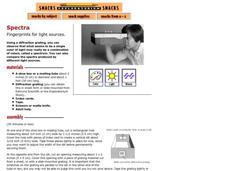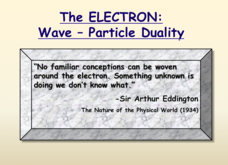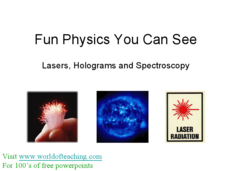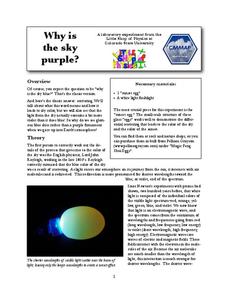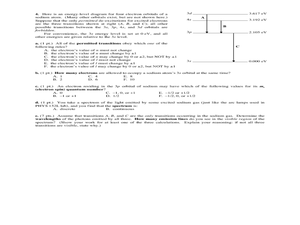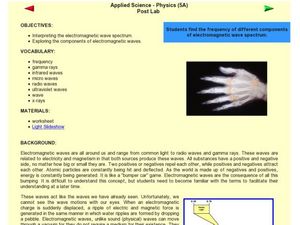Exploratorium
Spectra
Make a class set of spectrum tubes by first purchasing some diffraction grating, and then constructing the tools with mailing tubes or shoe boxes. If you aren't up for assembling them, you could purchase prepared spectroscope kits. This...
Curated OER
Light 3: All Those Seeing Color, Say Eye!
Young scholars explore the nature of light. They use on-line articles and a worksheet to explore the roles of the eye and brain in the perception of color. They draw and label a diagram illustrating the movement of light.
Science 4 Inquiry
It's Not All Visible
Electromagnetic waves travel though empty space, something no other wave type can accomplish. Young scientists learn more about the entire spectrum of electromagnetic waves. They sort cards and apply their knowledge to create models of...
Science Geek
The Dual Nature of the Electron
Why don't atoms collapse? Scientists debated this concept for years before they understood the dual nature of the electron. Presentation discusses the electron as both a particle and an energy wave. It also relates these concepts to the...
Curated OER
What's the Frequency, Roy G. Biv?
Introduce starting space scientists to the electromagnetic spectrum, expecially the portion of visible light. Teach them about wavelength and frequesncy. Then give them a roll of adding machine tape and a manila folder to make a...
Curated OER
Spectral Lines
Slides and slides of emission spectra bring this topic to light for your physics class! Exited electrons returning to lower energy levels is offered as the cause of emission spectra. In summary, viewers learn that we can determine the...
Curated OER
Fun Physics You Can See
Fascinating aspects of electromagnetic radiation and its use in obtaining and transferring information are described here. Learners will find the connections to current technology interesting. Although the slides are text-heavy, they do...
Curated OER
Electromagnetic Spectrum Worksheet
These six multiple-choice questions ask pupils to evaluate the energy, wavelength, and frequency of particular electromagnetic wavelengths. Further questions then require them to apply their knowledge and convert certain values or give...
Curated OER
THE MANY COLORS OF SUNLIGHT
Students examine rainbow components, spectral colors, colors perceived by the eye, hot solids, glowing rarefied gas, absorption, that light is a wave, and optics.
Colorado State University
Why Is the Sky Purple?
The color of the sky depends on the time of day. Young scholars experiment with scattering different wavelengths of light to recreate the color of the sky. They observe both the longer blue wavelengths and the shorter red and orange...
Curated OER
Physics 152 Fall 2004 Final Exam, Parts A, B, C, D
At the end of a general physics course focused on light and electricity, you can administer this exam. Concepts covered include electromagnetism, circuits, induction, light rays, lenses and mirrors, characteristics of light, electron...
IOP Institute of Physics
Physics in Concert
What do physicists and musicians have in common? A lot more than you might think. After first viewing a slide show presentation and completing a series of skills practice worksheets on the physics of light, sound, and electricity, young...
Curated OER
Light and Optics
In this science worksheet, students look for the words to fill in the crossword puzzle that is focused upon the concepts of light and optics.
Curated OER
Measuring Star Temperatures
For this measuring star temperatures, students find the temperature of a star using Planck's curve and the Wein Displacement law. Students also find the peak wavelengths for given stars using Planck's curve.
Curated OER
The Effects of Light and Temperature on the Growth and Development of Plants
Students investigate the effects of light and temperature on plant growth and development. For this plant growth lesson plan, students use radish plants and cover them with different shades of green and red transparencies and observe...
Curated OER
Understanding Light: Lesson 2 - The Electromagnetic Spectrum
Young scholars investigate the Electromagnetic Spectrum and realize there is energy beyond visible light. They identify parts of the EM Spectrum.
Curated OER
Check Out Lights and Shields with Beads
Learners explore Ultraviolet detecting beads and conduct several investigations with them. In this investigative lesson students participate in an experiment to see the harmful effects of UV light and discuss their findings.
Curated OER
Light 2: The Lighter Side of Color
Young scholars explore light and color, including how colors are mixed to produce new colors, how light is filtered, and how light is reflected off of surfaces.
Messenger Education
Sensing the Invisible: The Herschel Experiment
The electromagnetic spectrum includes everything from very powerful gamma rays (which are used to treat cancer) to much weaker radio waves (which include microwaves). Through a hands-on activity, scholars explore the temperature...
NASA
Taking a Cold, Clear Look at the Universe
Take a look with another perspective. Pupils read to find out what portion of the electromagnetic spectrum a space telescope sees and the difficulties of viewing infrared radiation from other objects in space. Individuals discover how...
Curated OER
Making Waves with the Electromagnetic Spectrum
Students explore various types of electromagnetic waves, the range of the spectrum, and common sources of electromagnetic waves.
Curated OER
Electromagnetic Wave Spectrum
Fifth graders examine electromagnetic wave spectrum. In this science lesson plan, 5th graders discuss the aspects of the electromagnetic wave spectrum and complete a worksheet identifying the parts of the spectrum.
Curated OER
How to verify the relationship between the wavelength and frequency of light
Students collaborate in heterogeneous groups with each student having a different role. They comprehend the relationship between the frequency and wavelength of light. They record their observations in a table that is included on this...
Curated OER
Now You See Me, Now You Don't
Bioluminescence fascinates most upper elementary scientists. Display images of different glowing deep-sea organisms and discuss their environment. Young biologists then experiment with images and different colors of filtered light. In...


